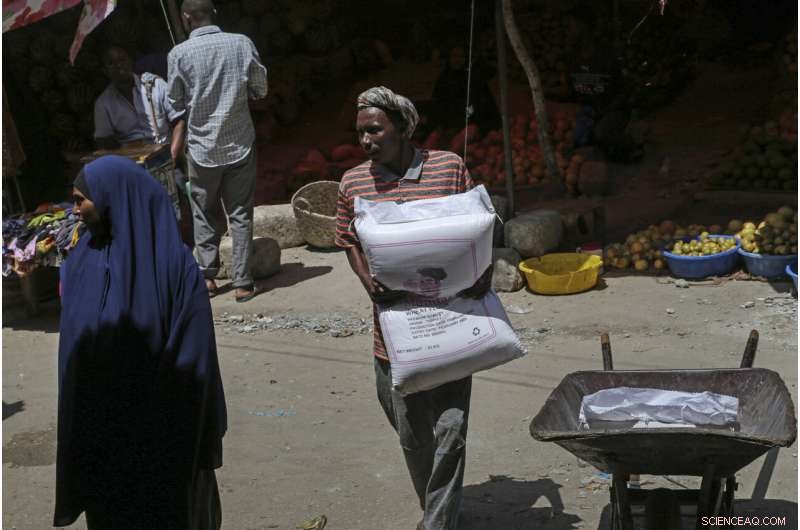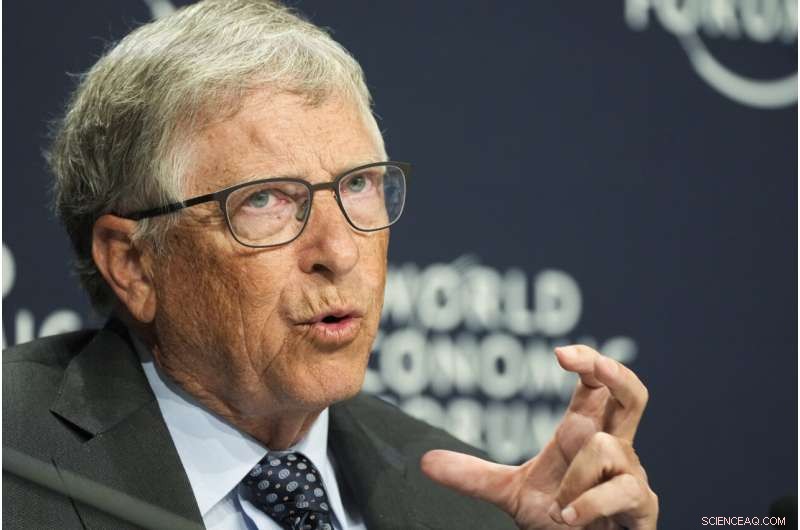
En man bär på en säck vetemjöl importerat från Turkiet på Hamar-Weyne-marknaden i huvudstaden Mogadishu, Somalia torsdagen den 26 maj 2022. Bill Gates uppmanade världsledare att inte ge upp de mål de satt upp för att minska hunger och fattigdom trots enorma motgångar nyligen dokumenterade i en ny rapport som släpptes tisdagen den 13 september av The Bill and Melinda Gates Foundation. Kredit:AP Photo/Farah Abdi Warsameh, Arkiv
Bill Gates säger att den globala hungerkrisen är så enorm att livsmedelsbiståndet inte helt kan lösa problemet. Vad som också behövs, hävdar Gates, är de typer av innovationer inom jordbruksteknologi som han länge har finansierat för att försöka vända krisen som dokumenterats i en rapport som släpptes på tisdagen av The Bill and Melinda Gates Foundation.
Gates pekar särskilt på ett genombrott som han kallar "magiska frön", grödor som är konstruerade för att anpassa sig till klimatförändringar och motstå skadedjur i jordbruket. Gates Foundation släppte på tisdagen också en karta som modellerar hur klimatförändringar sannolikt kommer att påverka odlingsförhållandena för grödor i olika länder för att markera det akuta behovet av åtgärder.
Genom att tilldela teknologin en framträdande roll för att ta itu med världens livsmedelskris, sätter Gates sig själv på kant med kritiker som säger att hans idéer står i konflikt med världsomspännande ansträngningar för att skydda miljön. De noterar att sådana frön i allmänhet behöver bekämpningsmedel och fossilbränslebaserade gödningsmedel för att växa.
Kritiker hävdar också att Gates tillvägagångssätt inte tar itu med krisens brådska. Att utveckla "magiska frön" tar år och kommer inte omedelbart att ge lättnad till länder som för närvarande utsätts för utbrett lidande eftersom de är beroende av livsmedelsimport eller upplever historiska torka.
Det är en debatt som kan intensifiera det internationella trycket för att uppfylla de gemensamma målen för globalt välstånd och fred, kända som FN:s mål för hållbar utveckling, före en deadline 2030. De 17 målen inkluderar att utrota fattigdom och hunger, bekämpa klimatförändringar, ge tillgång till rent vatten, arbeta för jämställdhet och minska ekonomisk ojämlikhet.
"Det är ganska dystert i förhållande till våra förhoppningar om 2030," sa Gates, 66, i en intervju med The Associated Press. Han tillade dock, "Jag är optimistisk att vi kan komma tillbaka på rätt spår."
Gates pekade på kriget i Ukraina och pandemin som de främsta orsakerna till den förvärrade hungerkrisen. Men hans budskap till andra givare och världsledare som samlas till FN:s generalförsamling i september är att livsmedelsbistånd inte kommer att räcka.
"Det är bra att människor vill förhindra att sina medmänniskor svälter när konflikter som Ukraina avbryter matförsörjningen", skriver Gates i den nya rapporten. Men det verkliga problemet, säger han, är att många länder med osäkra livsmedel inte producerar tillräckligt med sin egen mat – ett problem som säkerligen kommer att förvärras av konsekvenserna av klimatförändringarna.
"Temperaturen fortsätter att stiga," sa Gates. "Det finns inget sätt, utan innovation, att komma ens nära att föda Afrika. Jag menar, det fungerar bara inte."
Som han har gjort i mer än 15 år efterlyste Gates investeringar i jordbruksforskning, och lyfte fram majsfrön som trivs vid högre temperaturer och under torrare förhållanden än andra sorter. Dessa frön har utvecklats under ett program från African Agricultural Technology Foundation som stiftelsen har gett 131 miljoner dollar till sedan 2008.
Sedan dess har Gates Foundation spenderat 1,5 miljarder dollar på anslag fokuserade på jordbruk i Afrika, enligt Candid, en ideell organisation som forskar om filantropiska givande. Bill and Melinda Gates Foundation är till vissa mått den största privata stiftelsen i världen och är mest känd för sitt arbete med global hälsa, inklusive vacciner. Det började i sin nuvarande form år 2000, efter att Gates lämnade sin VD-post på Microsoft, den tekniska jätten han var med och grundade. Forbes uppskattar hans nettoförmögenhet till cirka 129 miljarder dollar.
The foundation's spending on agricultural development is why Gates' view on how countries should respond to food insecurity has taken on heightened importance in a year when a record 345 million people around the world are acutely hungry. The World Food Program said in July that tally represents an increase of 25% from before Russia invaded Ukraine in February and a 150% jump from before the pandemic struck in the spring of 2020.
In Ghana, field trials for four varieties of modified seeds began in 2013. But only this past summer has one been approved for commercialization, said Joeva Rock of the University of Cambridge. Activists there, she said, have asked whether those resources could have been better spent elsewhere.
"What would happen if those went into increasing funds to the national research centers in Ghana, to building roads, to building storage, to building silos or helping to build markets?" said Rock, who has written a book about food sovereignty in the country.
When asked, Gates acknowledged the importance of infrastructure like roads and other transportation systems.
"If you want your inputs like fertilizer to come in, if you want your output to go out, it's just too expensive in Africa without that infrastructure," he said, adding that building and maintaining roads is highly expensive.

Bill Gates, Co-Chair, Bill &Melinda Gates Foundation, speaks at a news conference during the World Economic Forum in Davos, Switzerland, Wednesday, May 25, 2022. Gates urged world leaders not to give up on the goals they set to reduce hunger and poverty despite huge recent setbacks documented in a new report released Tuesday, Sept. 13 by The Bill and Melinda Gates Foundation. Credit:AP Photo/Markus Schreiber, File
Some researchers question the wisdom of pursuing the fundamental premise that Gates has embraced:Increasing agricultural production through the use of modified seeds along with fertilizers and pesticides. They point to the environmental footprint of industrial agriculture, including the use of fossil fuel-based fertilizers, the degradation of soil quality and the diminishing of biodiversity.
Alternatives could include agroecological interventions, like developing locally managed seed banks, composting systems to promote soil health and pesticide interventions that don't rely on chemicals, experts said. Over time, those approaches can reduce the need for food aid and build more resilient farming systems, according to Rachel Bezner Kerr, a professor of global development at Cornell University.
Kerr, a lead author of the food chapter of the latest report from the International Panel on Climate Change, said that while the panel doesn't make recommendations, "overall, the kind of focus on a few technologies and reliance on fossil fuel-based inputs isn't in line with ecosystem-based adaptation" or a biodiverse future.
Mark Suzman, CEO of the Gates Foundation, defends its approach warning that limiting access to fertilizers means farmers cannot increase their yields.
"Fertilizer is necessary. You simply cannot meet the overall productivity gains without it," Suzman said, speaking on a call with reporters.
In his interview with the AP, Gates himself dismissed criticisms of the foundation's emphasis on modified seeds.
"If there's some non-innovation solution, you know, like singing 'Kumbaya,' I'll put money behind it," Gates said. "But if you don't have those seeds, the numbers just don't work." He added, "If somebody says we're ignoring some solution, I don't think they're looking at what we're doing."
Another project the foundation has funded is the development of computer models that try to measure crop loss caused by disease or pests. The idea is to direct research and responses to where they are needed most.
"It's not just, how do we get through this crisis and get back to normal? It's, what does the future normal look like?" said Cambria Finegold, the director of digital development for CABI, an intergovernmental nonprofit that is developing the models.
Melinda French Gates, the other co-chair of the Gates Foundation, highlighted in a separate letter the halting progress toward gender equity worldwide. Since January, the foundation has expanded its board, adding six new members to help direct its work, a move that followed the announcement of the Gateses' divorce last summer.
French Gates has agreed to step down after two years if the two decided they could not continue to work together. French Gates, who also founded an investment organization called Pivotal Ventures, was not available for an interview.
Gates said he is lucky that his former wife has continued to put her time and energy into the foundation. In July, Gates said he would contribute $20 billion to the foundation in response to the significant setbacks caused by the pandemic, raising its endowment to approximately $70 billion.
Through his giving, investments and public speaking, Gates has held the spotlight in recent years, especially on the topics of vaccines and climate change. But he has also been the subject of conspiracy theories that play off his role as a developer of new technologies and his place among the highest echelons of the wealthy and powerful.
Gates said he does not spend time thinking about conspiracies and that his foundation's work has nothing to do with his personal reputation.
"If you go into these countries, they've never heard of me or the foundation," Gates said. "Maybe in the rich world somebody is reading some internet thing, but the people we care about have never, will never, and it's not important that they ever know who I am." + Utforska vidare
© 2022 Associated Press. Alla rättigheter förbehållna. Detta material får inte publiceras, sändas, skrivas om eller omdistribueras utan tillstånd.